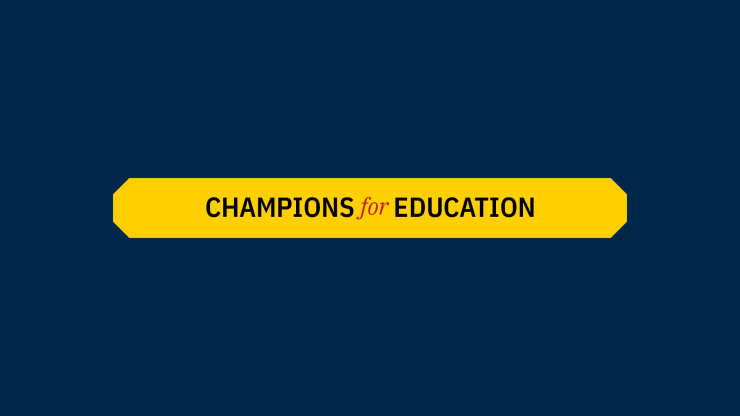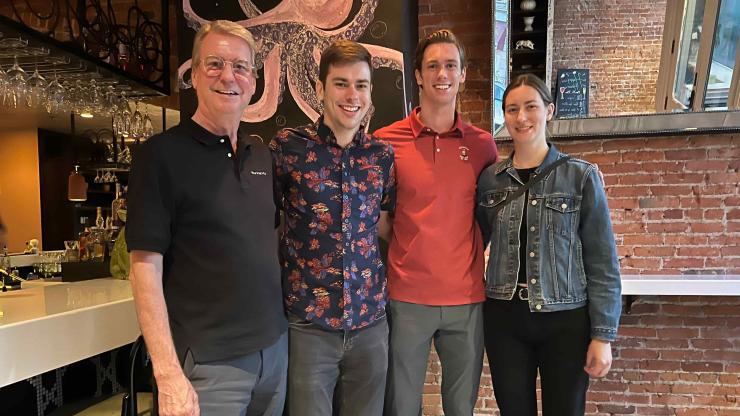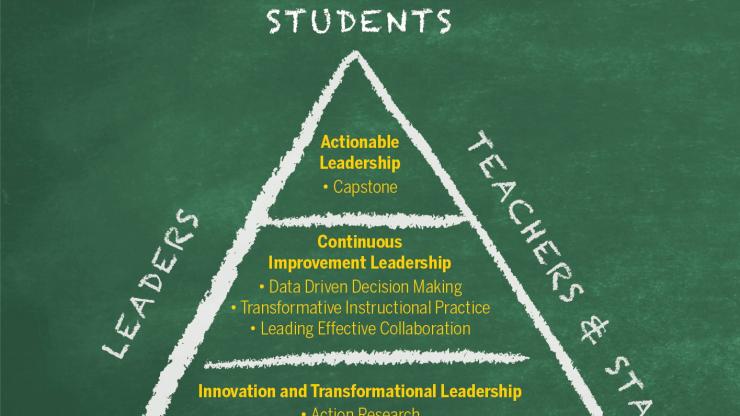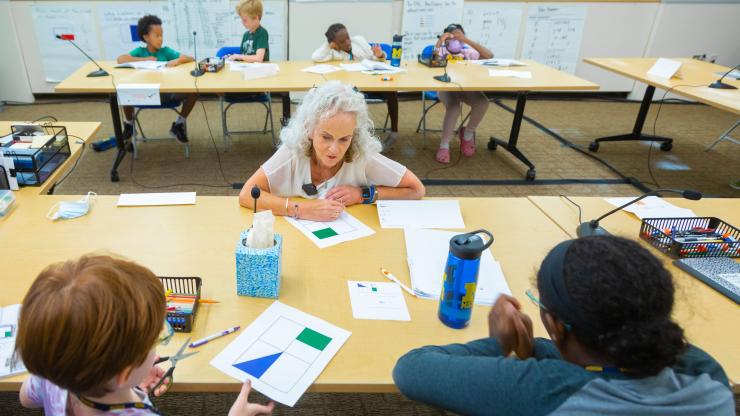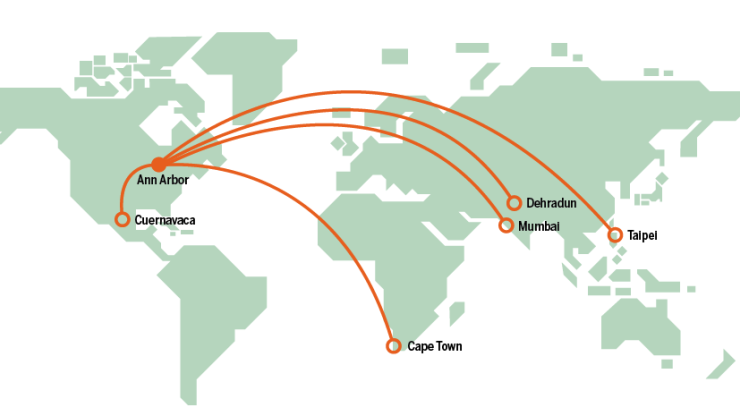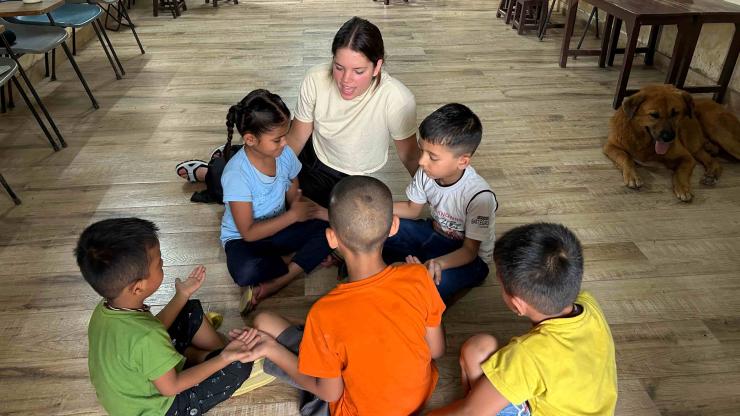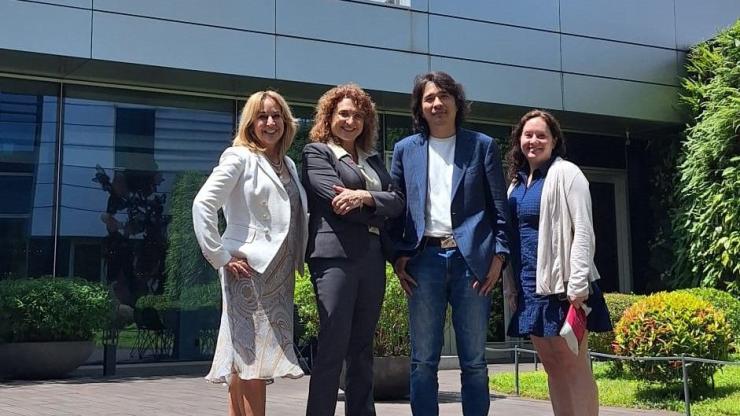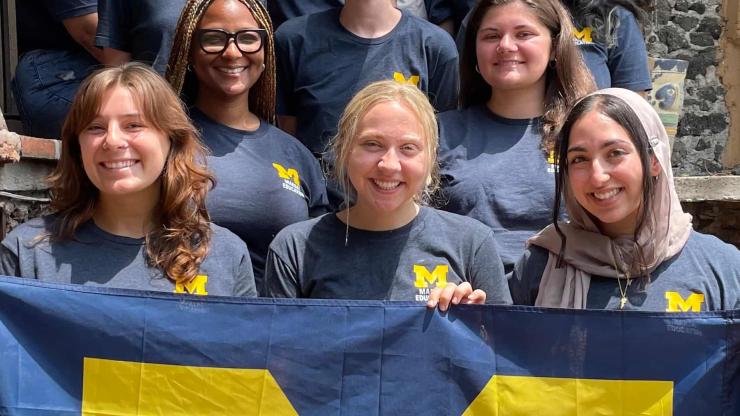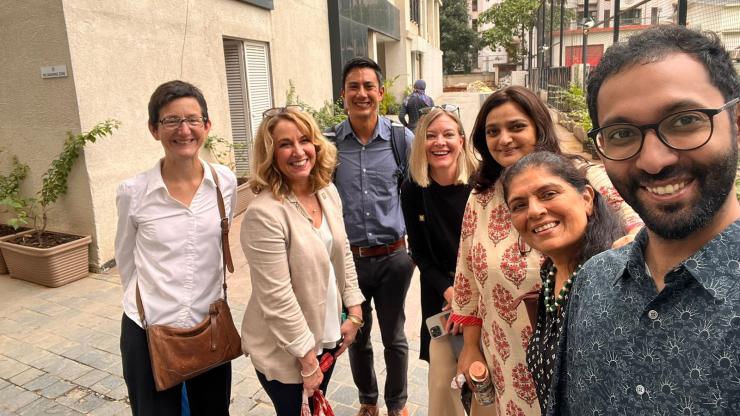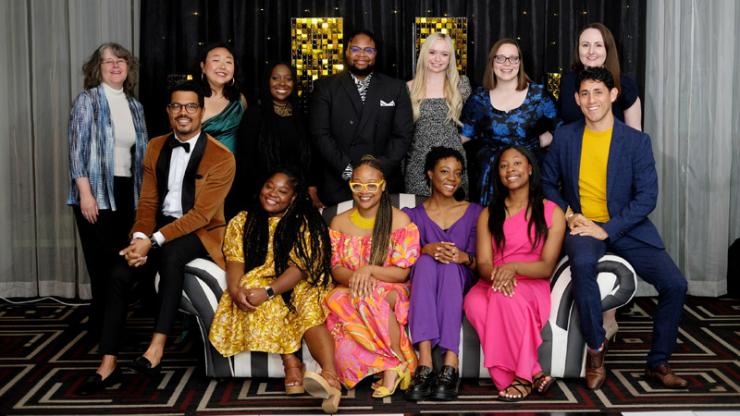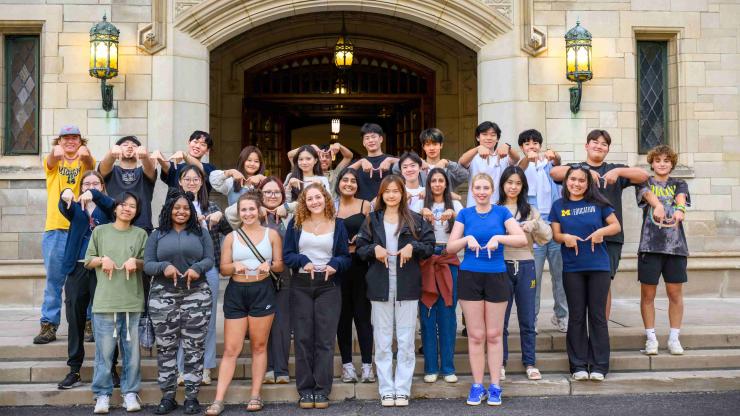For Transformative Education, Look to Michigan
The University of Michigan will be the defining public university, boldly exemplified by our innovation and service to the common good. We will leverage our interdisciplinarity and excellence at scale to educate learners, advance society, and make groundbreaking discoveries to impact the greatest challenges facing humanity.
Wherever Wolverines go, progress follows.
The University of Michigan publicly launched the Look to Michigan Campaign on October 25, 2024. This campaign will focus on raising the resources to actualize the university’s bold Vision 2034, the result of a collaborative, cross-campus process to articulate the University of Michigan’s aspirations toward tackling urgent challenges, pursuing pioneering solutions, and making a meaningful difference.
The university’s vision for the campaign is organized around four foci: high-quality education for all, health and well-being, sustainability, and democracy. As one of the top institutions studying education, the Marsal School is proving that human progress in any field of study is built upon access to high-quality education. The goal of a university, then, must be to use its academic and research missions to make it possible for all to have access to the best learning opportunities.
Marsal School alumna, donor, and member of the Dean’s Advisory Council Stacy Giles (ABEd ’95, TeachCert ’95) is serving as a volunteer in the Look to Michigan campaign. “At the Marsal School, we aim to be a pivotal part of the university’s four global challenges while promoting human well-being,” Giles says. “Living with purpose is vital. We focus on nurturing the whole person rather than solely on academic success. Encouraging human flourishing creates an atmosphere where students are more involved and equipped to face difficulties. By prioritizing character development, self-awareness, and empathy in addition to academics, schools lay the groundwork for students to excel both in their studies and personal lives. This holistic approach sets students up for long-term success.”
The Marsal Family School of Education's Bold Campaign Goals Will Propel this Work Forward
The Marsal School is focusing on four overarching priorities to deliver on the promise of education to create a healthier, more sustainable, civically engaged world. These broad investments will go toward improving opportunities to learn for all people through research and practice; pursuing partnerships and public scholarship; supporting future educators; and elevating the Marsal community.
U-M alumna and donor Carin Ehrenberg (AB ’88) graciously agreed to lead the Dean’s Advisory Council Campaign Committee for the Look to Michigan campaign. “I believe excellent educators are crucial to all four pillars of our campaign because teaching is at the intersection of learning, collaboration, and empathy,” says Ehrenberg. “The Marsal School is focused on teaching the Leaders and Best of the future of education, providing affordable degrees for educators and researchers, and having a measurable, positive, scalable impact on society. By increasing our resources through the Look to Michigan campaign, we will be able to deepen our commitment to both research and practice in creating the educational leaders of the future.”
Improving Opportunities to Learn for all People through Research and Practice
For well over a century, the Marsal School has been well regarded as a leader in education research designed to improve how people learn and teach. Today, people across the world look to Marsal to do rigorous research, share findings broadly, engage communities, and help create solutions to the most pressing challenges of our time.
From research on universal preschool to college-level mathematics instruction; youth civic engagement to career readiness; and AI technology in the elementary, secondary, and postsecondary classrooms to higher education access and success, Marsal Education is making a difference in ways that matter to people and communities.
For example, rapid developments in technology such as AI require education researchers to understand its implications for teaching and learning. Marsal researchers need to investigate how emerging AI tools for personalized learning systems and intelligent tutoring are being used by learners and educators; how AI shapes the impacts on motivation, achievement, and critical thinking skills; and the ethical implications of AI in education, including issues of bias, privacy, and the potential for unequal access.
With the October 16, 2024 public launch of the Eileen Lappin Weiser Center for the Learning Sciences, the Marsal School underscored its leadership role in designing tools and practices that support human development across the lifespan and advance equitable and just learning systems. This center is a hub for discoveries around human sensemaking, curiosity, creativity, and understanding. The center’s work encompasses an extensive set of fields of study that can and should inform learning in all its forms and contexts. This work is important for meeting the needs of all kinds of learners, preparing people for the jobs of the future, and helping people develop understanding across differences.
Our newest undergraduate degree program, Learning, Equity, and Problem Solving for the Public Good (LEAPS) also offers and expands learning possibilities for university learners. LEAPS blends the world-changing capabilities of a leading public research university with community-based learning on the beautiful Marygrove campus in Detroit. During the first year, students live and learn together in Detroit as a cohort before defining individualized concentrations toward future careers. LEAPS students learn how to support people to work together effectively to create change by developing strong collaboration, communication, and leadership skills.
Pursuing Partnerships and Public Scholarship
The Marsal School is committed to partnerships with schools and communities to collaborate on advancing the goals of those communities and schools, and to provide supportive environments to prepare teachers, school leaders, policymakers, and researchers.
The school has two powerful and long-term institutional partnerships with public school districts in Michigan. One is the Mitchell Scarlett Huron Teaching and Learning Collaborative. The multifaceted nature of this partnership allows Marsal faculty and students to work shoulder to shoulder with classroom teachers and school administrators to create transformative, inclusive, and just learning opportunities.
The second robust and long-standing partnership is with the Detroit Public Schools Community District, Starfish Family Services, the Marygrove Conservancy, and the Kresge Foundation—the Detroit P-20 Partnership. Together, this public-private collaboration created the Marygrove Learning Community (MLC) in 2019, which features a prenatal-through-early-childhood education center, a K-12 public school, the Michigan Education Teaching School, and a wide range of health and human services. On the MLC campus, families have the uncommon opportunity to send their children to schools with an evidence-based, aligned curriculum from infancy through high school. Children and youth benefit from a holistic approach to education, one that accounts for their health and developmental needs while providing outstanding academic opportunities.
Nearly every University of Michigan school and college has engaged in the work of the Marygrove Learning Community under Marsal’s leadership. From engineering faculty working with Marsal to co-develop a high school robotics curriculum to the School of Dentistry establishing a clinic to serve the school children, teachers, and neighborhood members, the university’s powerful interdisciplinarity has come together with the indomitable spirit of an amazing Detroit neighborhood, all in the service of children and youth learning. Imagine the model we can provide together for the state, the nation, and globe through these partnerships as we transform education to serve all learners.
Supporting Future Educators

To do this work, we must educate the future practitioners and leaders of education opportunity, including PreK-12 teachers and leaders, college and university leaders and educators, and education researchers and policy makers. The Marsal School prepares education professionals who bring their expertise into PreK-12 schools, higher education institutions, informal learning settings (such as museums, libraries, and summer camps), research think tanks, businesses, and government agencies.
As an education alumna, parent of an education alumna, and longtime donor to the school, Kathleen Marsal (ABEd ’72, TeachCert ’72) advocates for greater public recognition of the role that access to high-quality education for all plays in growing a strong and stable society. “It is vitally important to start educating children in preschool and maintain our commitments to high-quality education through upper school,” Marsal says. “Unfortunately the nation does not have enough well-prepared teachers to reach this goal, but the Marsal Family School of Education is committed to changing that reality through the Teach Blue Commitment, in which the school commits to financially supporting Michigan students who commit themselves to the teaching profession.”
The growing shortage of well-prepared teachers in the U.S. unequally affects children around the country and is a danger to the health of our society. As fewer people are entering the teaching profession and disparities in educational opportunities across our nation continue to widen, Marsal faculty remain dedicated to preparing teachers and other child-serving professionals, such as school leaders, tutors, and more, at the very highest level. We know that a well-prepared teacher makes the greatest difference in a child’s learning life; imagine what schools full of truly prepared teachers might be able to do to transform education. And our students at Marsal are truly prepared. They learn and practice how people learn most effectively, drawing from the latest education evidence. They learn and practice how to teach children to read, using all the dimensions of reading sciences. They learn and practice how to engage even the youngest children in meaningful scientific inquiry. They learn and practice how to serve children from a range of backgrounds with equitable and inclusive teaching practices. Marsal students of teaching learn and practice so much more. We need to recruit more teacher candidates to Marsal and continue to support them throughout their careers so that they can serve our nation’s children.
With the challenge of the PreK-12 teacher shortage requiring creative and multifaceted solutions, the Teach Blue Initiative features prominently in our campaign as a key strategy to elevate teachers’ incredible contributions to society. The vision of Teach Blue is to introduce opportunities and resources that work together to support educators at all stages of their careers. As leaders in teacher education with robust school and community partnerships, we are uniquely poised to meet the prevailing challenges to the profession through a fresh approach to recruitment and retention.
Teach Blue begins with helping people discover the profession and see themselves as teachers. “We start with thinking early about how to recruit people into the profession,” Dean Moje says. “We're thinking about ways that we can help middle and high school students consider a future in teaching, but also about how to reach adults who want to change their profession.”
The next dimension of Teach Blue is to invest in scholarships and other forms of support for tuition and cost of attendance. The Teach Blue Commitment offers funding packages that significantly offset the cost of education degrees—up to and including tuition-free degrees—for many students seeking teacher certification. We want to be able to pledge to prospective students that if they commit to the teaching profession, then we will commit to them by supporting their Michigan Marsal education financially for all four years.
Upon graduation, newly certified teachers can apply to be teaching residents at the Michigan Education Teaching School, housed at The School at Marygrove. The teaching school is based on the idea of a teaching hospital, used in the field of medicine. At the Teaching School, everyone shares two goals: Educate children and educate their teachers and other child-serving professionals.
The final dimension of Teach Blue is to elevate those who have stayed in the profession. In 2024, the first cohort of Teach Blue Fellows returned to campus to work with faculty to study “problems of practice.” The Marsal School celebrates the career accomplishments of these teachers and engages them in helping us recruit and educate the next generation.
Elevating the Marsal Community

The final funding priority of the Marsal Look to Michigan campaign is to support a healthy and vibrant learning environment that elevates its members. As we grow with our freshman admission of LEAPS students and more and more future teachers come on board, Marsal Education seeks to provide physical spaces that enable the work just described. Just as a home is more than four walls, the growing Marsal School community needs a physical environment that supports ambitious work, is accessible and inclusive, and is welcoming to the university students, faculty, staff, and community members who enter.
We have an amazing space that stands as a tribute to the legacy of our forebears such as John Dewey or our University Elementary and High School leaders, teachers, and PreK-12 students who walked these halls from 1924 to 1968. But we need to renovate. Indeed, we are bursting at the seams and must expand our physical footprint to make more accessible space for the work of our exciting future. We need to make use of the beautiful space in our open-air courtyard. We need to add an elevator. We need a space for community building that can support our students, staff, and faculty in thriving as they do the demanding work of providing the highest quality education for all. We need a space that reflects our stature and our prominence both at the university and in society. Education matters and having the space to educate well is essential.
Marsal’s contributions to humanity and society are limitless. Harnessing the power of research, practice, and policy—not as separate and complementary but as deeply intertwined—the Marsal School is leading the way forward in partnership with the many communities we serve.
“I invite everyone to partner with us in this work,” says Dean Moje. “‘Look to Michigan’ is more than a slogan for this campaign: Just as we see ‘leaders and best’ not as a boast, but as a charge to lead and be our best in the service of others, we see Look to Michigan as a call to action. Marsal will answer that call, with your support. The Marsal Family School of Education has a vital role to play in fulfilling the goals of the university’s Vision 2034 and, in doing so, propelling human progress justly and equitably.”



